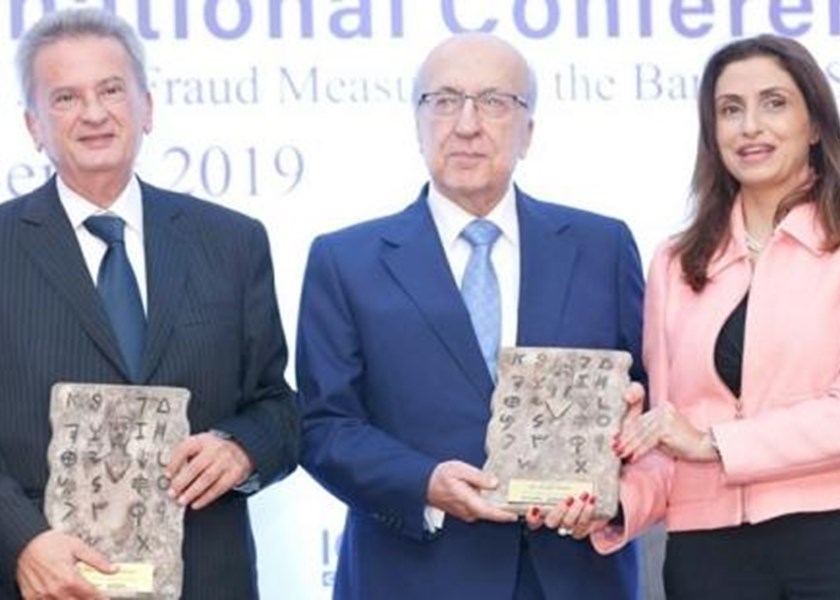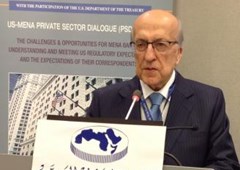Source: The Daily Star | 12 October 2019 | Country: Beirut, Lebanon
Lebanon fighting fraud: Salameh

BEIRUT: Central Bank Governor Riad Salameh said Friday that Banque du Liban and financial authorities had frozen and
lifted banking secrecy on suspicious accounts involved in corruption and embezzlement. Speaking at the opening of an
ICC-FraudNet conference, Salameh said BDL had been able to detect and uncover several corruption-related cases thanks
to authorities’ supervision over the banking sector and with the latter’s cooperation.
“As a result of these efforts, funds were frozen and the banking secrecy obligation was lifted on numerous pertinent
bank accounts vis-a-vis the judiciary in order to take the appropriate legal measures. Moreover, a couple of banks
operating in Lebanon were subject to penalties, and thereafter an official administrator was appointed by the Central
Bank to manage these banks, as a result of their involvement in facilitating the channeling of funds derived from
corruption crimes,” Salameh said. He did not identify the two banks.
“The negative impact of corruption and fraud on societies, particularly in a country like Lebanon, are immense. They
could obstruct economic growth, decrease public funds and, as a result, public confidence,” he warned.
Salameh said Lebanon acceded to the U.N. Convention Against Corruption in April 2009 with the extensive involvement of
BDL in its negotiation due to the distinctive nature of the Lebanese banking system, in particular the banking secrecy
obligation.
“Concurrently, due to such secrecy requirements and to the fact that there is a strong link between corruption and
other financial crimes, namely money laundering, the mandate of the Lebanese Special Investigation Commission, headed
by myself as the governor of the Central Bank of Lebanon, was extended to cover corruption-related issues,” Salameh
said.
He indicated that to this end, BDL had issued a set of regulations for the sector, including setting standards on
beneficial ownership transparency, to assist in identifying beneficial owners of legal entities and trusts.
“We are also committed to ensure that our banks apply the highest international best practices in conducting their due
diligence on the management structures and sources of funds of their clients. Banks operating in Lebanon are
continuously encouraged to strengthen their compliance systems and have the necessary resources to identify any
suspicious patterns of fraud or corruption,” Salameh said.
He said the government was finalizing its national anti-corruption strategy, which includes the creation of a national
commission for fighting corruption that will create awareness and follow up on the fight for eliminating corruption
while liaising with the judicial branch of the government.
Joseph Torbey, chairman of the World Union of Arab Bankers and chairman and general manager of Credit Libanais Group,
highlighted the conference’s importance.
“Roughly a third of financial organizations in the Middle East, surveyed by PricewaterhouseCoopers have reported being
subjected to cases of fraud between 2016 and 2018, with costs ranging from $100,000 to $50 million per organization.
More than half of fraud cases in the MENA region were attributed to asset misappropriation, mainly by employees or
senior managers, with cybercrime accounting for another third, and the rest credited to procurement, bribery and
corruption,” Torbey said.
He added that compliance budgets in the MENA region had now matched global figures, with more set to be spent in the
future.
“Many countries in the region have established robust financial regulatory authorities, such as the Dubai Financial
Services Authority or the Financial Services Regulatory Authority in the United Arab Emirates, and the Special
Investigation Commission in Lebanon, and have also set laws aimed at defining and penalizing financial crimes, notably
in the UAE and Lebanon,” he said.
Torbey stressed that fighting corruption went beyond reforms.
“Investing in education and spreading transparency and anti-fraud awareness is an important means to turn the tide
against corruption,” Torbey said.
Share on



